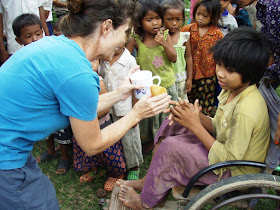"When people come to you for help, do not turn them off with pious words, saying, 'Have faith and take your troubles to God.' Act instead as though there were no God, as though there were only one person in the world who could help -- only yourself." (Rabbi Moshe Leib of Sasov, quoted in Tales of the Hasidim, by Martin Buber.)There is a pretty strong motif, especially in my early writing, that presses the Pauline metaphor of the body of Christ to wider interpretation. What I mean is, I said things like, "I myself am the bread of life," by which I meant "I-me-the-singer," not simply "I-Jesus." The song "Like You" from Mystery prays the prayer of John Gabriel Perboyre, CM, the Vincentian martyr of the French revolution:
"Let my hands be your hands, Jesus, please.The identification of Jesus with his disciples and Christ with the church in St. Paul and certainly in the gospels of John and Matthew is a binding thread of New Testament christology. It is a physical identification, or rather, a complete human identification. "Whoever welcomes you welcomes me," and "I live now no longer I, but Christ lives in me," and "Whatever you do to one of the least of these, you do to me," and other sayings articulate a truth about the intimacy between the Lord and us. We know that the scripture says these things, but we don't always play them out for their moral consequences.
Let my heart be your heart.
Think your thoughts in me."
As a composer and liturgical minister of the word, I want to try to help the assembly understand itself as the ministering Christ, celebrate that reality, and when necessary appreciate the dissonance between the theological reality implied by baptism and the way we actually live once we get out of the church doors. Of course, God is love, forgiveness, and understands our weakness, but we need to be awakened sometimes to the world of escape that religion can provide. We aren't allowed to imagine that worship is a substitute for compassionate action, for the work of distributive justice. We cannot say to the poor and confused, "Go to Christ." We need to learn to say, "Come to us."
Empowering this kind of behavior in our parishes will call forth a certain type of minister who makes connections between the needs of some and the gifts of others. This is exactly how the Church is supposed to work, as St. Paul suggests in 1 Corinthians, when in his metaphor of the body he suggests that "gifts are given for the good of the whole body."
The singers on the version heard on Do Not Fear to Hope were all members of a family who used to sing at St. Jerome, the Denks: Gary, Pamela (Parafiniuk), and Maria. The version we recorded on Change Our Hearts was our usual trio with a few extra singers.
I wrote "Come to Us" after being inspired by a homily preached by Vernon Meyer, my second pastor at St. Jerome and a fine biblical scholar, on the gospel for the 13th Sunday in Ordinary Time, from Matthew 11: 37-42. It must have made an impression on me. I remember that some time after that day, I was backing my car out of the parking lot after work there, and a man was walking along barefoot, or maybe with cardboard on his feet. This is, in Arizona, crazy, both in summer and in winter. I thought to myself, "Well, I have another pair at home," so I called out to him, and said, "I have more shoes, would you like these?" And he happily received them. I was about to pull away, and he asked me for the socks too. Of course I handed them over. What was I thinking?
Now, that stands out in my head not because I'm generous and do that all the time, but because I'm selfish and I don't ever do that. But we need to let the gospel work on us and change our behavior. Sometimes, even I do.
Now, that stands out in my head not because I'm generous and do that all the time, but because I'm selfish and I don't ever do that. But we need to let the gospel work on us and change our behavior. Sometimes, even I do.
Come to Us
by Rory Cooney
Come to me, come to us,
You who are burdened;
Come to the word, and come to the meal.
Come without question, or pressure, or price;
Come, be embraced by the body of Christ.
Come to me, come to us,
Pilgrim or stranger,
Looking for change, or challenge, or light.
We are the people whose calling is care,
Bearers of mercy, nourished in prayer.
Come to me, come to us,
Broken or building,
Come with your children, your choices, your chains.
All are invited to friendship or rest,
To share in our struggle, our call, and our quest.
Copyright © 1986 NALR. Published by OCP. All rights reserved.
Arrangement by Patti Drennan (J. W. Pepper website) (Hope Publications, SATB with keyboard & flute)
Handbell arrangement by William Lieven (GIA website)
Come to Us on the OCP website. (Special bonus! My picture!)










